True to Its Calling: The Nation uses Michael Lerner to attack Israel
By: Ronald Radosh
Friday, May 10, 2002
Michael Lerner’s credentials as a Rabbi and as a spokesman for American Jews were dealt with most effectively in these pages a short time ago. Now, not surprisingly, Lerner has a new additional forum for his viewsThe May 20 issue of The Nation offers us a lead editorial written by this self-proclaimed sage of dissident American Jews. Lerner begins by telling us how brave he is to risk the “calumny” of being critical of Israeli policy. Times are tough, he would have us believe, for the “social justice Jews” he claims to represent. I have news for “Rabbi” Lerner. To criticize Israeli policy in New York and San Francisco is no less brave than when a Northern liberal criticized Mississippi as a racist state in 1963. Hasn’t he read any recent issue of The New York Review of Books and the articles therein by Tony Judt, Anthony Lewis, Amos Elon and others? He is one small voice in a virtual crowd of critics of Ariel Sharon, who lack no outlet for their views.
Michael Lerner’s credentials as a Rabbi and as a spokesman for American Jews were dealt with most effectively in these pages a short time ago. Now, not surprisingly, Lerner has a new additional forum for his viewsThe May 20 issue of The Nation offers us a lead editorial written by this self-proclaimed sage of dissident American Jews. Lerner begins by telling us how brave he is to risk the “calumny” of being critical of Israeli policy. Times are tough, he would have us believe, for the “social justice Jews” he claims to represent. I have news for “Rabbi” Lerner. To criticize Israeli policy in New York and San Francisco is no less brave than when a Northern liberal criticized Mississippi as a racist state in 1963. Hasn’t he read any recent issue of The New York Review of Books and the articles therein by Tony Judt, Anthony Lewis, Amos Elon and others? He is one small voice in a virtual crowd of critics of Ariel Sharon, who lack no outlet for their views.
Lerner, however, is most irate. And while others try to wage serious arguments about pitfalls they see in Israeli policy, Lerner sets up and knocks down a series of straw men. First, he argues that a poll has shown that 50% of American Jews see a “commitment to social equality” as their most important concern; while only 17% cited a commitment to Israel. The only problem is that Lerner cites a 1988 Los Angeles Times polla fourteen year old and thus irrelevant poll that does not apply to the current situation, and the groundswell of support for Israel by a vast majority of America’s Jewish population. Indeed, there have been numerous articles citing a switch in sentiment of even traditionally political left/liberal Jews. A recent Time article quoted a Florida Jewish woman who described herself as liberal, and who told the reporter that “I’m listening to Rush Limbaugh and I like what I hear.” Indeed, the very same comment was made to my wife by a decidedly left-wing Jewish resident of Bethesda, Maryland the other day. I make no claim that this very small sample is any kind of a scientific pollbut it is certainly a bellwether of shifting attitudes.
Secondly, Lerner presents a very phony and transparent attempt to present himself as a moderate of the middle not part of the pro-Palestinian emerging left-wing protest movement. He is, he assures us, “outraged” by the “immoral acts of Palestinian terrorists.” What does he suggest Israel do about it? Should they fight back, and take the steps they necessarily took in Jenin? What should they do about the most recent terrorist attack? Should they repeat their tough policy in the Gaza area? Don’t hold out your hopes for Lerner endorsing any meaningful Israeli response to terrorism. What he does is give us a new dose of moral equivalence, by using the same language he has scolded the Palestinian terrorists with and applying it to Israel. He writes and this is indeed as good an example of the sordid use of moral equivalence as any ever used “many of understand that Israeli treatment of Palestinians has been immoral and outrageous.” Two equally immoral policies cancel each other out. Therefore an Israeli military response is simply compounding the immorality, making Israel the more guilty party.
Next, Lerner uses a dubious set of statistics about refugee flight after the 1948 Arab war against Israel. He cites “recent research by Israeli historians,” obviously referring to the new revisionist historians in Israel, without pausing to mention the reevaluation of one of its most prominent members, Benny Morris. Currently working on a new edition of his much discussed book on the Palestinian refugee problem, Morris now reveals in a careful and balanced discussion (in www.between-lines.org Dec. 2001) what great part was played in the refugee crisis by the Palestinian leadership. “One definitely can say,” Morris said, “that there was not an intentional, clear policy [by Israel] to expel the Palestinians from their localities.” Certainly, it was intended that fleeing Arabs not return; as Morris points out, the expulsion was justified. If one believes in the legitimacy of the Jewish state, which Morris does, then one has to realize that “if not [for] the expulsion, the state established would have been with a large Arab minority, with a large fifth column.” And Morris adds that any demand for a so-called “right of return” is simply “a recipe for destroying the State of Israel.” Most importantly, Morris, unlike Lerner, realizes that “the Arabs started the fighting. They started shooting.” Those who say Israel has a responsibility for the refugee problem are blaming those who were forced to fight by Arab aggression. The problem is clear. The Palestinians, Morris says, “don’t understand that there is justice on the other side.” They have one simple hope “that the state of Israel will not be here.”
Lerner also writes that three million Palestinian refugees live in horrid “refugee camps under Israeli military rule.” This statement, perhaps more than any other made by Lerner, reveals his deep ignorance. Not only are the Arab states deliberately and cynically keeping the refugees in camps, instead of welcoming them into their own societies or providing funds for modernization, but they are not under Israeli military rule. Those in Gaza and the West Bank live under either Palestinian Authority or UNRWA control. The other refugees are in camps in Lebanon, Syria and Jordan.
Lerner also reveals complete misunderstanding of the outcome of the Clinton administration negotiations at Oslo and Taba. He repeats the canard that Barak offered Arafat “less than had been promised in 1993″ and that he was offered nothing “in the way of reparations or compensation for the refugees.” I refer Lerner to the April 21 Fox News interview with former Middle East envoy Dennis Ross. Ross points out, in excruciating detail, how Arafat could not accept anything offered. As Ross notes, the US proposed that “97 percent of the territory…would go to the Palestinians,” and that the Arab neighborhoods in East Jerusalem would become the capitol of a new Palestinian state. Lerner also is wrong that nothing was offered in compensation. As Ross notes, refugees would be allowed to return to their own state, and a fund would be established for “$30 billion internationally …for either compensation to cover repatriation, resettlement, rehabilitation costs.” Ross terms the ideas “comprehensive, unprecedented” and that they “stretched very far.” But not far enough for those, like Arafat, whose true goal is the destruction of Israel. Indeed, Ross points out that an agreement would have pulled Israel entirely out of Gaza, and created free passage for Palestinians between Gaza and the West Bank. Lerner writes that “no Palestinian leader could have signed” the agreement offered them, because it would have “abandoned” the plight of the refugees. In fact, as Ross notes, Arafat rejected what all his negotiating team wanted to accept, and that “to this day the Palestinians have not presented to their own people what was available.”
In Lerner’s false scenario, the negotiations were not broken off, but continued at Taba until Sharon’s election “ended the process.” His evidence is that former Justice Minister Yossi Beilin said that both sides were close to “arriving at a full agreement,” one that Sharon did not want. In fact, this claim is that of Beilin and Lerner alone. In Israel, even mainstream dovish Israelis regard Beilin as untrustworthy. The claim that Sharon refused a deal because he never intended any agreement that that would abandon West Bank settlements is, frankly, a pathetic excuse for an argument. Lerner says that Sharon used “the excuse of responding to acts of terror by some Palestinians.” Note his adjective “some.” The Sharon response took place after the murderous escalation in suicide bombings culminating in the Passover Seder massacre. Sharon was responding to acts of terror paid for by Arafat and many of them which were carried out by factions of his own Fatah movement.
As for his argument Israel’s actions have caused a new wave of anti-Semitism, one can only comment that Lerner plays the old game of blaming the Jews themselves for anti-Semitic attacks. It is not Israel and its response to terrorism that is “leading to a frightening upsurge in anti-Semitism.” Rather, the new wave of anti-Semitism began before 9/11 and increased thereafter, as Islamic radicals argued Israel was responsible for the Twin Towers attack, and that Jews were destroying all societies in which they lived. These new anti-Semites, who use the existing stock of Nazi anti-Semitic tracts in the Arab lands, are not motivated by the actions of Jews, but rather, by the existence of Jews.
Lerner hopes that his newly announced “Tikkun Community” will be a new pro-peace alternative lobbying group for Jews in America, one that can replace and overtake the pro-Israel AIPAC. His hope has as much chance of succeeding as his magazine Tikkun does of becoming an intellectual alternative to Commentary. He announced that goal years ago. What he has produced is a left-wing Jewish version of The Nation that virtually no one takes seriously. No wonder he can write a virtual obscenity; that “the most destructive elements of the Jewish world,” by which he obviously means Israel, are pursuing “immoral policies” that produces “hatred of Jews.” The neo-Nazis of Europe and the anti-Semites of the Arab world must be happy now that they can quote “Rabbi” Michael Lerner about how the new hatred of the Jews is the fault of the Jews themselves. Too bad Henry Ford isn’t around to run Lerner in The Dearborn Independent.
Of course, Lerner has the chutzpah to offer his own solutions. These include a US sponsored multinational force to separate and protect Israelis and Palestinians from each other, which would end with a new international conference that would “impose” a final settlement. This would include what he calls “an end to the occupation,” reflecting his adoption of Palestinian radical terminology. The mantra of “illegal occupation” of the West Bank is, of course, regularly repeated by Palestinian spokesmen. This does not make it true. As Harold Waller and Howard Gerson argued in the May 3 Toronto Star, territory gained in a defensive war- such as that fought by Israel- may be legally occupied until a peace treat ends hostilities on a permanent basis. It is more accurate to refer to the West Bank areas as “disputed territory” whose status has to be finalized in negotiations. Thus the much cited UN Security Council Resolution 242 acknowledges Israel’s right to keep part of the territory it gained in the Six Day War in the context of a peace settlement. The main point, these two writers note, is that the claim of occupation is “a smokescreen to divert attention from the shameful neglect of their interests by a Palestinian Authority that has encouraged terrorism, pursued policies that inhibit economic growth and social development.” The very use of the term, they write, serves “the ends of those who would seek to isolate Israel.” No wonder Lerner uses it.
Of course, Lerner wants us to see him as a decent, peace loving Jew motivated by true love for Israel. He tells us that he wants “real security to both sides” and a “new spirit of generosity.” There is plenty of that spirit emanating from Israel; the problem is that there is hardly any from the Palestinian side. Peace can only be obtained if Arafat and other Palestinian leaders commit themselves to its realization; and abandon their dreams of destruction of Israel and its replacement by a new Palestine in former Israeli territory. And Arafat and the Palestinian Authority would have to guarantee that peace by enforcing the law against those radical militants whom they do not control rather than wink at them and treat them as brothers in the “resistance struggle.” As for generosity, one might note that this is not what one should be giving the kind of terrorists who shoot a five-year-old girl hiding under her bed in cold blood.
Lerner gives the game away when he writes that what is needed is “reconciliation between two peoples who share equally the blame for the current mess.” Yes, reconciliation is needed. The problem is very simple. Israelis have bent over backwards to do everything possible to attain that peace. Even now, polls in Israel reveal those who overwhelmingly back Sharon’s tough military response to terror also favor an eventual settlement and a Palestinian state. Where are the equivalent Palestinians who favor the right of Israel to exist, and who are willing to make concessions and sign a real peace treaty? The fact is that both sides do not share the blame. Perhaps Lerner is still living the in the ‘70s and ‘80s, when people like him used to argue that both the US and the Soviet Union shared the blame for the Cold War, and that the “peace movement” had to continually attack the real enemy, American imperialism. The mindset is the same, but the real enemy to Lerner and company is Israel, as it once was the United States.
What Michael Lerner cannot accept is the simple truth. Barak offered a real peace at Camp David and at Tabamaking the kind of concessions many in Israel thought would never be made. Yasser Arafat turned it down, preferring to launch a war of terror against Israel. Now he has paid the price for that decision.
Perhaps we really don’t have much to worry about when contemplating Michael Lerner’s efforts. He spent a small fortune with full-page ads in both The New York Times and The Washington Post announcing his gala sit-in at the State Department a few weeks ago, in which he and Cornel West practiced “non-violent civil disobedience.” The effort, as reported in the press, was comical. They forgot a microphone; no one could hear them, and at any rate, less than two hundred people showed up, and it was not clear that those present were all part of their demonstration. Now he calls for “international volunteers” in the West Bank. Why not call for their presence at the cafes and pizzerias in Tel Aviv and Jerusalem, perhaps in the evening hours, when they are deserted, as most residents fear a new wave of terror? Maybe the Palestinian Authority, seeing their friend Michael Lerner in residence, would turn their suicide bombers back?
Certainly, The Nation is shrewd to use Lerner to state its editorial position. Previously, they ran unabashedly anti-Israel tirades, from proclaimed opponents of Israel like Edward Said. Lerner tries to claim that he is spokesman for a new “middle path of ‘tough love’ for Israel.” Poor Michael Lerner. When Israel needs solidarity, support and lobbying at home for American backing for its necessary war against terror, his idea of “tough love” is pressure to “end the occupation;” in other words, the very demand of the Palestinian “resistance.” With friends like that, as the saying goes.
By: Ronald Radosh
Friday, May 10, 2002
Michael Lerner’s credentials as a Rabbi and as a spokesman for American Jews were dealt with most effectively in these pages a short time ago. Now, not surprisingly, Lerner has a new additional forum for his viewsThe May 20 issue of The Nation offers us a lead editorial written by this self-proclaimed sage of dissident American Jews. Lerner begins by telling us how brave he is to risk the “calumny” of being critical of Israeli policy. Times are tough, he would have us believe, for the “social justice Jews” he claims to represent. I have news for “Rabbi” Lerner. To criticize Israeli policy in New York and San Francisco is no less brave than when a Northern liberal criticized Mississippi as a racist state in 1963. Hasn’t he read any recent issue of The New York Review of Books and the articles therein by Tony Judt, Anthony Lewis, Amos Elon and others? He is one small voice in a virtual crowd of critics of Ariel Sharon, who lack no outlet for their views.
Michael Lerner’s credentials as a Rabbi and as a spokesman for American Jews were dealt with most effectively in these pages a short time ago. Now, not surprisingly, Lerner has a new additional forum for his viewsThe May 20 issue of The Nation offers us a lead editorial written by this self-proclaimed sage of dissident American Jews. Lerner begins by telling us how brave he is to risk the “calumny” of being critical of Israeli policy. Times are tough, he would have us believe, for the “social justice Jews” he claims to represent. I have news for “Rabbi” Lerner. To criticize Israeli policy in New York and San Francisco is no less brave than when a Northern liberal criticized Mississippi as a racist state in 1963. Hasn’t he read any recent issue of The New York Review of Books and the articles therein by Tony Judt, Anthony Lewis, Amos Elon and others? He is one small voice in a virtual crowd of critics of Ariel Sharon, who lack no outlet for their views.
Lerner, however, is most irate. And while others try to wage serious arguments about pitfalls they see in Israeli policy, Lerner sets up and knocks down a series of straw men. First, he argues that a poll has shown that 50% of American Jews see a “commitment to social equality” as their most important concern; while only 17% cited a commitment to Israel. The only problem is that Lerner cites a 1988 Los Angeles Times polla fourteen year old and thus irrelevant poll that does not apply to the current situation, and the groundswell of support for Israel by a vast majority of America’s Jewish population. Indeed, there have been numerous articles citing a switch in sentiment of even traditionally political left/liberal Jews. A recent Time article quoted a Florida Jewish woman who described herself as liberal, and who told the reporter that “I’m listening to Rush Limbaugh and I like what I hear.” Indeed, the very same comment was made to my wife by a decidedly left-wing Jewish resident of Bethesda, Maryland the other day. I make no claim that this very small sample is any kind of a scientific pollbut it is certainly a bellwether of shifting attitudes.
Secondly, Lerner presents a very phony and transparent attempt to present himself as a moderate of the middle not part of the pro-Palestinian emerging left-wing protest movement. He is, he assures us, “outraged” by the “immoral acts of Palestinian terrorists.” What does he suggest Israel do about it? Should they fight back, and take the steps they necessarily took in Jenin? What should they do about the most recent terrorist attack? Should they repeat their tough policy in the Gaza area? Don’t hold out your hopes for Lerner endorsing any meaningful Israeli response to terrorism. What he does is give us a new dose of moral equivalence, by using the same language he has scolded the Palestinian terrorists with and applying it to Israel. He writes and this is indeed as good an example of the sordid use of moral equivalence as any ever used “many of understand that Israeli treatment of Palestinians has been immoral and outrageous.” Two equally immoral policies cancel each other out. Therefore an Israeli military response is simply compounding the immorality, making Israel the more guilty party.
Next, Lerner uses a dubious set of statistics about refugee flight after the 1948 Arab war against Israel. He cites “recent research by Israeli historians,” obviously referring to the new revisionist historians in Israel, without pausing to mention the reevaluation of one of its most prominent members, Benny Morris. Currently working on a new edition of his much discussed book on the Palestinian refugee problem, Morris now reveals in a careful and balanced discussion (in www.between-lines.org Dec. 2001) what great part was played in the refugee crisis by the Palestinian leadership. “One definitely can say,” Morris said, “that there was not an intentional, clear policy [by Israel] to expel the Palestinians from their localities.” Certainly, it was intended that fleeing Arabs not return; as Morris points out, the expulsion was justified. If one believes in the legitimacy of the Jewish state, which Morris does, then one has to realize that “if not [for] the expulsion, the state established would have been with a large Arab minority, with a large fifth column.” And Morris adds that any demand for a so-called “right of return” is simply “a recipe for destroying the State of Israel.” Most importantly, Morris, unlike Lerner, realizes that “the Arabs started the fighting. They started shooting.” Those who say Israel has a responsibility for the refugee problem are blaming those who were forced to fight by Arab aggression. The problem is clear. The Palestinians, Morris says, “don’t understand that there is justice on the other side.” They have one simple hope “that the state of Israel will not be here.”
Lerner also writes that three million Palestinian refugees live in horrid “refugee camps under Israeli military rule.” This statement, perhaps more than any other made by Lerner, reveals his deep ignorance. Not only are the Arab states deliberately and cynically keeping the refugees in camps, instead of welcoming them into their own societies or providing funds for modernization, but they are not under Israeli military rule. Those in Gaza and the West Bank live under either Palestinian Authority or UNRWA control. The other refugees are in camps in Lebanon, Syria and Jordan.
Lerner also reveals complete misunderstanding of the outcome of the Clinton administration negotiations at Oslo and Taba. He repeats the canard that Barak offered Arafat “less than had been promised in 1993″ and that he was offered nothing “in the way of reparations or compensation for the refugees.” I refer Lerner to the April 21 Fox News interview with former Middle East envoy Dennis Ross. Ross points out, in excruciating detail, how Arafat could not accept anything offered. As Ross notes, the US proposed that “97 percent of the territory…would go to the Palestinians,” and that the Arab neighborhoods in East Jerusalem would become the capitol of a new Palestinian state. Lerner also is wrong that nothing was offered in compensation. As Ross notes, refugees would be allowed to return to their own state, and a fund would be established for “$30 billion internationally …for either compensation to cover repatriation, resettlement, rehabilitation costs.” Ross terms the ideas “comprehensive, unprecedented” and that they “stretched very far.” But not far enough for those, like Arafat, whose true goal is the destruction of Israel. Indeed, Ross points out that an agreement would have pulled Israel entirely out of Gaza, and created free passage for Palestinians between Gaza and the West Bank. Lerner writes that “no Palestinian leader could have signed” the agreement offered them, because it would have “abandoned” the plight of the refugees. In fact, as Ross notes, Arafat rejected what all his negotiating team wanted to accept, and that “to this day the Palestinians have not presented to their own people what was available.”
In Lerner’s false scenario, the negotiations were not broken off, but continued at Taba until Sharon’s election “ended the process.” His evidence is that former Justice Minister Yossi Beilin said that both sides were close to “arriving at a full agreement,” one that Sharon did not want. In fact, this claim is that of Beilin and Lerner alone. In Israel, even mainstream dovish Israelis regard Beilin as untrustworthy. The claim that Sharon refused a deal because he never intended any agreement that that would abandon West Bank settlements is, frankly, a pathetic excuse for an argument. Lerner says that Sharon used “the excuse of responding to acts of terror by some Palestinians.” Note his adjective “some.” The Sharon response took place after the murderous escalation in suicide bombings culminating in the Passover Seder massacre. Sharon was responding to acts of terror paid for by Arafat and many of them which were carried out by factions of his own Fatah movement.
As for his argument Israel’s actions have caused a new wave of anti-Semitism, one can only comment that Lerner plays the old game of blaming the Jews themselves for anti-Semitic attacks. It is not Israel and its response to terrorism that is “leading to a frightening upsurge in anti-Semitism.” Rather, the new wave of anti-Semitism began before 9/11 and increased thereafter, as Islamic radicals argued Israel was responsible for the Twin Towers attack, and that Jews were destroying all societies in which they lived. These new anti-Semites, who use the existing stock of Nazi anti-Semitic tracts in the Arab lands, are not motivated by the actions of Jews, but rather, by the existence of Jews.
Lerner hopes that his newly announced “Tikkun Community” will be a new pro-peace alternative lobbying group for Jews in America, one that can replace and overtake the pro-Israel AIPAC. His hope has as much chance of succeeding as his magazine Tikkun does of becoming an intellectual alternative to Commentary. He announced that goal years ago. What he has produced is a left-wing Jewish version of The Nation that virtually no one takes seriously. No wonder he can write a virtual obscenity; that “the most destructive elements of the Jewish world,” by which he obviously means Israel, are pursuing “immoral policies” that produces “hatred of Jews.” The neo-Nazis of Europe and the anti-Semites of the Arab world must be happy now that they can quote “Rabbi” Michael Lerner about how the new hatred of the Jews is the fault of the Jews themselves. Too bad Henry Ford isn’t around to run Lerner in The Dearborn Independent.
Of course, Lerner has the chutzpah to offer his own solutions. These include a US sponsored multinational force to separate and protect Israelis and Palestinians from each other, which would end with a new international conference that would “impose” a final settlement. This would include what he calls “an end to the occupation,” reflecting his adoption of Palestinian radical terminology. The mantra of “illegal occupation” of the West Bank is, of course, regularly repeated by Palestinian spokesmen. This does not make it true. As Harold Waller and Howard Gerson argued in the May 3 Toronto Star, territory gained in a defensive war- such as that fought by Israel- may be legally occupied until a peace treat ends hostilities on a permanent basis. It is more accurate to refer to the West Bank areas as “disputed territory” whose status has to be finalized in negotiations. Thus the much cited UN Security Council Resolution 242 acknowledges Israel’s right to keep part of the territory it gained in the Six Day War in the context of a peace settlement. The main point, these two writers note, is that the claim of occupation is “a smokescreen to divert attention from the shameful neglect of their interests by a Palestinian Authority that has encouraged terrorism, pursued policies that inhibit economic growth and social development.” The very use of the term, they write, serves “the ends of those who would seek to isolate Israel.” No wonder Lerner uses it.
Of course, Lerner wants us to see him as a decent, peace loving Jew motivated by true love for Israel. He tells us that he wants “real security to both sides” and a “new spirit of generosity.” There is plenty of that spirit emanating from Israel; the problem is that there is hardly any from the Palestinian side. Peace can only be obtained if Arafat and other Palestinian leaders commit themselves to its realization; and abandon their dreams of destruction of Israel and its replacement by a new Palestine in former Israeli territory. And Arafat and the Palestinian Authority would have to guarantee that peace by enforcing the law against those radical militants whom they do not control rather than wink at them and treat them as brothers in the “resistance struggle.” As for generosity, one might note that this is not what one should be giving the kind of terrorists who shoot a five-year-old girl hiding under her bed in cold blood.
Lerner gives the game away when he writes that what is needed is “reconciliation between two peoples who share equally the blame for the current mess.” Yes, reconciliation is needed. The problem is very simple. Israelis have bent over backwards to do everything possible to attain that peace. Even now, polls in Israel reveal those who overwhelmingly back Sharon’s tough military response to terror also favor an eventual settlement and a Palestinian state. Where are the equivalent Palestinians who favor the right of Israel to exist, and who are willing to make concessions and sign a real peace treaty? The fact is that both sides do not share the blame. Perhaps Lerner is still living the in the ‘70s and ‘80s, when people like him used to argue that both the US and the Soviet Union shared the blame for the Cold War, and that the “peace movement” had to continually attack the real enemy, American imperialism. The mindset is the same, but the real enemy to Lerner and company is Israel, as it once was the United States.
What Michael Lerner cannot accept is the simple truth. Barak offered a real peace at Camp David and at Tabamaking the kind of concessions many in Israel thought would never be made. Yasser Arafat turned it down, preferring to launch a war of terror against Israel. Now he has paid the price for that decision.
Perhaps we really don’t have much to worry about when contemplating Michael Lerner’s efforts. He spent a small fortune with full-page ads in both The New York Times and The Washington Post announcing his gala sit-in at the State Department a few weeks ago, in which he and Cornel West practiced “non-violent civil disobedience.” The effort, as reported in the press, was comical. They forgot a microphone; no one could hear them, and at any rate, less than two hundred people showed up, and it was not clear that those present were all part of their demonstration. Now he calls for “international volunteers” in the West Bank. Why not call for their presence at the cafes and pizzerias in Tel Aviv and Jerusalem, perhaps in the evening hours, when they are deserted, as most residents fear a new wave of terror? Maybe the Palestinian Authority, seeing their friend Michael Lerner in residence, would turn their suicide bombers back?
Certainly, The Nation is shrewd to use Lerner to state its editorial position. Previously, they ran unabashedly anti-Israel tirades, from proclaimed opponents of Israel like Edward Said. Lerner tries to claim that he is spokesman for a new “middle path of ‘tough love’ for Israel.” Poor Michael Lerner. When Israel needs solidarity, support and lobbying at home for American backing for its necessary war against terror, his idea of “tough love” is pressure to “end the occupation;” in other words, the very demand of the Palestinian “resistance.” With friends like that, as the saying goes.













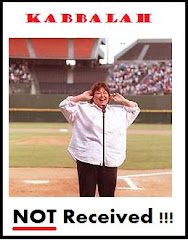


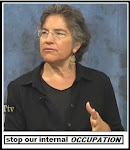





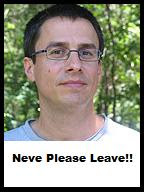



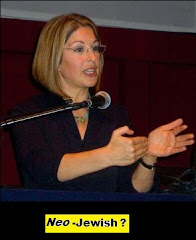


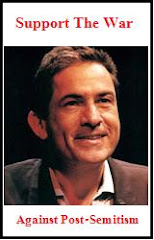

















1 comment:
Can anyone tell me the name of the dog that ate Michael Lerner's smicha?
Post a Comment